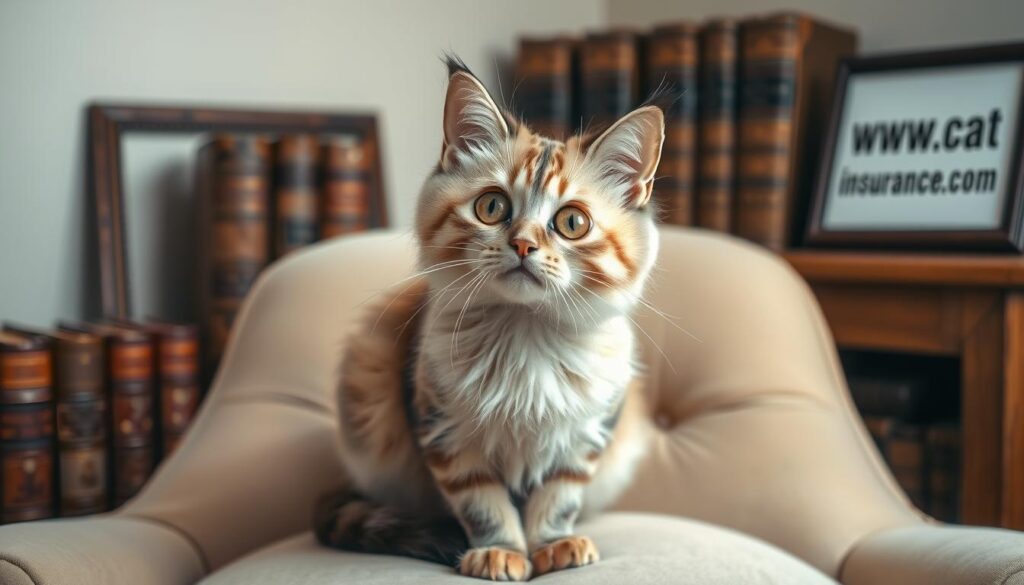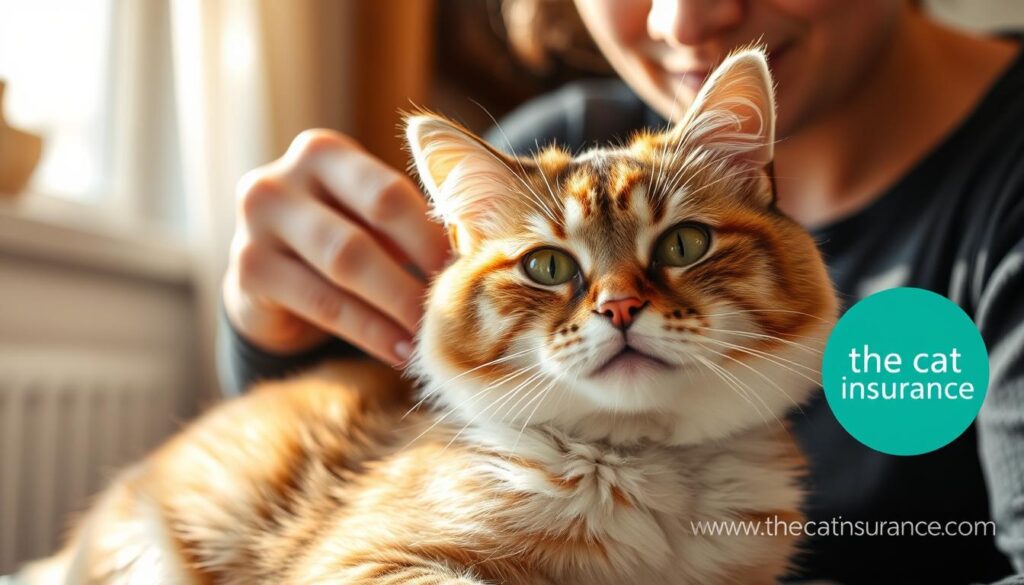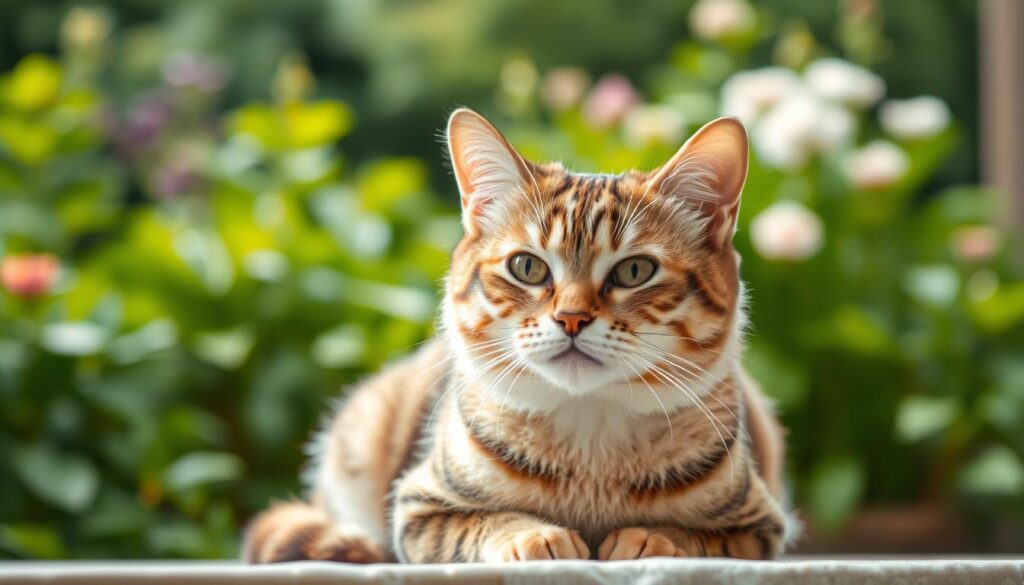Down syndrome cat : Cats have long been cherished companions, bringing joy and comfort to millions. Among these, a special group captures hearts. They are the Down Syndrome cats.
Have you met a Down Syndrome cat? They touch hearts with their unique traits. These cats need more than usual care. They require a deep understanding of their special health and emotional needs.
Thinking of adding a special needs cat to your family? It’s key to know their needs and how to meet them. For those on this path, checking out insurance like www.thecatinsurance.com can offer peace of mind.
Key Takeaways
- Down Syndrome cats have unique characteristics that set them apart.
- Caring for these cats requires a deeper understanding of their needs.
- Special needs cats bring immense joy to their owners.
- Understanding their health and emotional needs is crucial.
- Exploring insurance options can provide peace of mind for cat owners.
What We Know About Down Syndrome Cat Conditions Today
Cats can’t be born with Down syndrome like humans. But, they can show similar traits. This is important for cat lovers to know, as it changes how we care for them.
The term “Down syndrome cat” or “feline with Down syndrome” describes cats with genetic issues. These issues make them act and look like humans with Down syndrome. A rare condition called trisomy 74 is one example.
Recent Research and Veterinary Perspectives
New studies have helped us understand genetic conditions in cats. These conditions are not the same as human Down syndrome. But, they need similar care and attention.
Cats with these conditions might need more vet visits and special care plans. Insurance, like what’s offered at www.thecatinsurance.com, can help with the costs of caring for a cat with Down syndrome.
Vets are learning more about treating these cats. They stress the need for tailored care and management.
Debunking Common Myths and Misconceptions
There’s a lot of wrong information about Down syndrome in cats. Some think these cats are more aggressive or can’t be pets. But, with the right care, many live happy lives as pets.
Knowing the truth about these conditions helps us support cat owners. It also makes our community more welcoming and caring for all cats, no matter their genetics.
The Science Behind Feline Genetic Conditions
Learning about the genetic issues in cats, especially those like Down Syndrome, takes us into the complex world of cat genetics. Cats, like humans, can be born with or get genetic problems that change their life quality. As a cat owner, knowing the causes of these issues is key to giving your special needs cat the best care.
Chromosomal Differences Between Humans and Cats
It’s important to note the chromosomal differences between humans and cats. Humans have 23 pairs of chromosomes, while cats have 19 pairs. This big difference means genetic issues show up differently in each species. Down Syndrome in humans is caused by an extra chromosome 21. But cats don’t have the same chromosomes, so they can’t have Down Syndrome like humans do.
Instead, cats with disabilities might have other genetic problems that look similar. These can include physical or mental issues.
Studying cat genetics is hard and involves learning how genetic issues are passed down and shown. Veterinary science and genetic research are always getting better, helping us understand and care for cats with genetic problems.
Genetic Conditions That Mimic Down Syndrome Symptoms
Even though cats can’t have Down Syndrome like humans, some genetic issues can look like it. These can include physical problems, slow development, and mental issues. For example, a kitten with Down syndrome-like traits might have a genetic problem or chromosomal issue that affects how it grows.
Some common genetic problems in cats that might look like Down Syndrome include:
- Chromosomal issues
- Genetic mutations that affect growth
- Inherited disorders that impact physical and mental growth
Knowing about these conditions is vital for cat owners and vets to give the right care and support to affected cats. By spotting the signs and symptoms of these genetic issues, you can help your cat stay healthy and happy.
Meet the Down Syndrome Cat Stars Changing Perceptions
Down syndrome cats are making waves on social media. They’re changing how we see them and raising awareness. These cats have won many hearts and become symbols of hope. They show us that life can be full and meaningful, even with challenges.
Social Media Sensations and Their Stories
Instagram and Facebook are full of Down syndrome cat accounts. They share the cats’ daily lives and the special bond with their owners. These stories are not just fun; they teach us a lot. They help clear up myths and show what these cats can do.
Some owners talk about how their cats have learned to live with Down syndrome. They show their cats’ strength. Others talk about the unique personalities of their pets. They prove that these cats are just as special as any other cat.

How These Special Cats Are Raising Awareness
Down syndrome cats on social media are doing more than entertaining. They’re helping people understand the condition better. By sharing their stories, owners teach us about caring for these cats.
| Awareness Method | Impact |
|---|---|
| Sharing Personal Stories | Humanizes the condition, making it relatable |
| Educational Content | Informs about the condition and care requirements |
| Community Building | Creates a support network for owners and enthusiasts |
By embracing these special cats, we’re not just changing how we see them. We’re also building a more welcoming and supportive community for all pets with special needs.
Identifying Characteristics of Cats with Down Syndrome-Like Features
Learning about cats with Down syndrome can improve your care for them. These cats often have special physical and behavioral traits. These traits make them different from other cats.
Distinctive Physical Traits You Might Notice
Cats with Down syndrome may have certain physical features. These include:
- A flattened nose
- Widely spaced eyes
- Unusual ear shape or size
- Delayed growth or smaller size
These traits can vary and may come with health issues. It’s key to watch your cat’s health and talk to a vet if you’re worried.
| Physical Trait | Description | Potential Impact |
|---|---|---|
| Flattened Nose | A nose that is shorter or more compact than usual | May affect breathing or lead to respiratory issues |
| Widely Spaced Eyes | Eyes that are farther apart than typical | Can be a cosmetic issue, but may also be associated with vision problems |
| Unusual Ear Shape or Size | Ears that are differently shaped or sized | May affect hearing or be a sign of underlying health issues |
Unique Behavioral Patterns and Personality Traits
Cats with Down syndrome also have special behaviors and personalities. These can include:
- Increased affection and social interaction
- Playfulness and curiosity
- Potential for cognitive or developmental delays
Knowing these traits helps you care for your cat better. For example, very affectionate cats need more attention.
By understanding and valuing your cat’s unique traits, you can create a better life for them. This makes their life more fulfilling.
Health Challenges Your Down Syndrome Cat May Face
If you have a special needs cat, you might wonder about their health challenges. Cats with Down syndrome or similar conditions need careful care and attention. They have unique health needs.
Common Medical Issues and Recent Treatment Advances
Cats with Down syndrome or similar conditions face many health issues. These include heart defects, vision and hearing problems, and weak immune systems. Thanks to new vet care, managing these issues has gotten better.
Cardiovascular surgery can fix some heart problems. Physical therapy can also help with mobility and strength. Regular vet visits are key to keeping your cat healthy.
Your vet can spot health problems early and suggest treatments. For vision issues, making the environment safe is helpful. This includes removing dangers and making spaces easy to navigate.
- Regular health check-ups
- Monitoring for signs of illness or discomfort
- Adjusting their environment to meet their needs
What to Expect for Lifespan and Quality of Life
The life span and quality of life for cats with disabilities vary. It depends on the severity of their condition and the care they get. With the right care, many special needs cats can live happy lives.
Factors like the cat’s ability to do daily tasks, pain levels, and happiness are key. By focusing on these, you can greatly improve your cat’s life.
| Health Aspect | Potential Issue | Management Strategy |
|---|---|---|
| Heart Conditions | Congenital heart defects | Cardiovascular surgery, regular monitoring |
| Vision Impairment | Blindness or limited vision | Environmental modifications, safety precautions |
| Immune System | Weakened immunity | Preventive care, vaccinations, monitoring |
Understanding health challenges and taking action can greatly improve your cat’s life. Your love and care are crucial for their happiness and well-being.
Creating the Perfect Care Routine for Your Special Needs Feline
Creating a nurturing environment for your Down syndrome cat is crucial for their well-being. As a cat owner, you play a vital role in ensuring your pet receives the care and attention they need to thrive. By understanding their unique requirements, you can tailor a care routine that addresses their specific needs.
Specialized Dietary Requirements and Feeding Techniques
Cats with Down syndrome may have specific dietary needs that require careful consideration. Consult with your veterinarian to determine the best diet for your cat, taking into account any health issues or allergies. Feeding techniques may also need to be adjusted to accommodate your cat’s individual needs, such as using slow-feeder bowls to prevent gobbling.
A balanced diet rich in essential nutrients is vital for maintaining your cat’s overall health. Consider incorporating high-quality, nutrient-dense cat food that is tailored to their life stage and health status. Regular monitoring of your cat’s weight and health will help you make informed decisions about their diet.
Home Environment Modifications for Safety and Comfort
Modifying your home environment can help ensure your Down syndrome cat’s safety and comfort. Remove any hazards or obstacles that could cause injury, and provide a comfortable, quiet space for your cat to rest. Consider using cat-proofing measures such as securing loose wires and toxic substances out of reach.

Creating a safe and welcoming environment will help your cat feel secure and relaxed. You can achieve this by providing multiple hiding spots, such as cardboard boxes or tunnels, and ensuring your home is at a comfortable temperature.
Exercise and Mental Stimulation Approaches
Down syndrome cats require regular exercise and mental stimulation to prevent boredom and stress. Engage your cat in play activities that are tailored to their abilities, such as using feather wands or interactive toys. You can also provide mental stimulation through puzzle toys filled with treats, challenging your cat to figure out how to get them out.
Regular veterinary check-ups are crucial for monitoring the health of your Down syndrome cat. By working closely with your veterinarian, you can identify any potential health issues early on and develop a plan to address them. For more information on insurance options that can help cover the costs of caring for a special needs cat, visit www.thecatinsurance.com.
- Provide regular veterinary check-ups
- Tailor a diet to your cat’s specific needs
- Create a safe and comfortable home environment
- Engage your cat in play and mental stimulation activities
Managing the Financial Aspects of Special Needs Cat Care
Caring for a special needs cat, like one with Down syndrome, needs love, dedication, and smart money planning. These cats need special care, which can raise your household costs.
Looking after a special needs cat costs more than usual cat care. You’ll need to budget for their health, special care, and maybe insurance for unexpected vet bills.
Insurance Options Available Through www.thecatinsurance.com
Pet insurance can help with the costs of a kitten with Down syndrome. www.thecatinsurance.com has plans that cover vet bills, including for genetic issues or special needs.
- Accident and illness coverage
- Wellness and preventative care options
- Genetic condition coverage (check policy details)
When picking an insurance plan, check the policy well. Look at coverage limits, deductibles, and any exclusions for pre-existing conditions or special needs.
Budgeting for Specialized Veterinary Care and Treatments
Creating a budget for your cat’s special care is key. This includes:
- Regular vet visits
- Special treatments or therapies
- Potential surgeries or interventions
Vets say early diagnosis and care plans can greatly improve a cat’s life. Setting aside money for these needs ensures your cat gets the best care.
“The key to caring for a special needs cat is not just about managing their medical needs but also about providing a loving and supportive environment.” – Veterinary Expert
Understanding and planning for the financial side helps. This way, your special needs cat gets the care they need without breaking the bank.
Opening Your Home to a Special Needs Cat: The Adoption Journey
Adopting a cat with disabilities is a big decision. It can also be very rewarding. If you’re thinking about adopting a Down Syndrome cat, you need to be ready to give lots of care and love.
Where to Find Special Needs Cats Awaiting Homes
Looking to adopt a cat with special needs? There are many places to start. Local special needs cat shelters and rescue organizations are great resources. You can also find help online and through social media groups for special needs pets.
Preparing Your Family and Living Space
Before you bring a special needs cat home, get your family and space ready. Make sure your home is safe by removing dangers and securing wires. Teach your family how to gently and safely interact with a cat that may need special care.
| Preparation Task | Description |
|---|---|
| Cat-Proofing | Remove hazardous materials, secure loose wires |
| Family Education | Teach gentle interaction, understand cat’s needs |
| Home Adjustments | Modify home to accommodate cat’s disabilities |
Building a Support Network of Specialists and Fellow Owners
Having a support network is key for your cat’s and your well-being. Look for veterinarians experienced in caring for cats with disabilities. Connect with other owners online or in local groups. Joining support groups for pets with special needs can also be helpful.
Conclusion: The Immeasurable Rewards of Loving a Special Cat
Caring for a cat with Down syndrome is incredibly rewarding. These cats bring special joys and challenges into our lives. By understanding their unique needs, we can create a loving space for them to grow.
These cats teach us about patience, understanding, and the beauty of diversity. The bond with them is built on trust, care, and love. As you care for a cat with Down syndrome, you’ll find endless rewards.
With the right care, your Down Syndrome cat can live a happy life. Whether you’re new or experienced, the love and companionship they offer is priceless.

